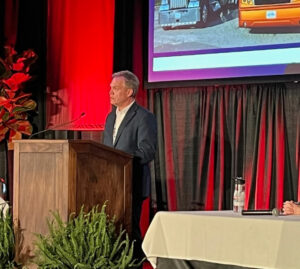FMCSA provides updates on driver compensation, detention time studies

LOUISVILLE, Ky. – The Federal Motor Carrier Safety Administration is conducting two studies that aim to “correct market failures and improve safety.”
As part of an FMCSA presentation on Thursday, March 30, at the Mid-America Trucking Show, the agency provided updates on studies looking at truck driver compensation and detention time.
“It is our hope that conducting these studies and publishing the reports will raise visibility to what I call micromarket failures, which have existed for a while,” said Tom Keane, FMCSA’s associate administrator. “(FMCSA hopes) this will reduce barriers to doing your job and also to improve your personal safety and highway safety overall.”
Driver compensation study
The driver compensation study was mandated by Congress as part of the 2021 infrastructure law. FMCSA was directed to task the Transportation Research Board with conducting a study on the effects of various methods of driver compensation on safety and driver retention, including hourly pay, payment for detention time and other pay methods used in the industry.
The study started with a closed session meeting in November, followed by meetings in January and March that included public and closed sessions. A minimum of six meetings will be conducted before the study is complete.
Tom Weakley of the OOIDA Foundation spoke to the committee in January about how a pay-by-the mile system costs drivers money and is a detriment to safety.
“Compensation that pays by the mile is a killer,” Weakley said. “Compensation that pays by the mile will get you violations. Compensation that pays you by the mile is a problem that needs to be adjusted and worked with.”
The study is expected to be completed in July 2024. At that time, a formal report with recommendations will be made to Congress.
“What we’re hearing from Congress is that they’re really hoping for actionable recommendations for the next authorization bill,” said Nicole Michel of FMCSA.
Detention time study
Another FMCSA study is taking a look at the prevalence of detention time in the trucking industry.
The objectives of this study:
- Collect data on commercial motor vehicle driver detention time that is representative of the major segments of the motor carrier industry and analyze it to determine the frequency and severity of detention time.
- Assess the utility of existing intelligent transportation systems technology solutions to measure detention time.
- Write a final report that summarizes the findings, answers the research questions below, and offers strategies to reduce detention times.
In 2018, DOT’s Office of Inspector General reported that detention time increased crash risks and costs but that the current data limited further analysis. The report recommended that FMCSA collaborate with industry stakeholders to develop and implement a plan to collect and analyze “reliable, accurate, and representative data on the frequency and severity of driver detention.”
Some of the findings from OIG’s report included that a 15-minute increase in time that a truck spent at a facility increased the average expected crash rate by 6.2%, and that detention time costs for-hire truck drivers between $1.1 and $1.3 billion each year.
An OOIDA Foundation survey found that drivers lose as much as $1,500 each week in uncompensated detention time. FMCSA’s presentation showed that detention time accounted for as much as $1.3 billion in lost wages and as much as $6.5 billion in driving time.
FMCSA’s Jonathan Mueller called fixing detention time “a high priority” in the industry.
The three-year study is scheduled to conclude in July 2025. LL









